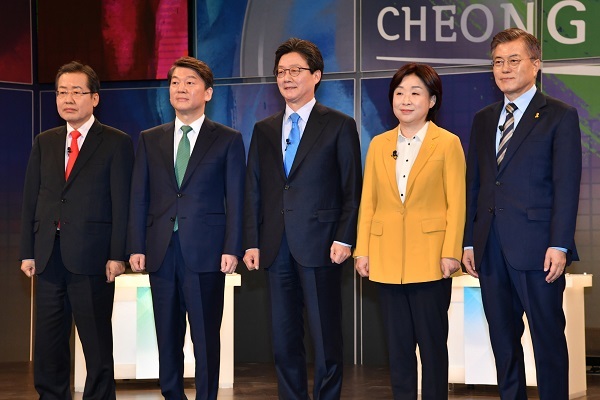 |
The five major presidential candidates for the May 9 election participate in the first TV presidential debate, Thursday. From left are Hong Joon-pyo of the Liberty Korea Party, Ahn Cheol-soo of the People’s Party, Yoo Seong-min of the Bareun Party, Sim Sang-jeung of the Justice Party and Moon Jae-in of the Democratic Party of Korea. (Yonhap) |
Meanwhile, all the candidates have also pledged to renegotiate a December 2015 settlement on the wartime sex slavery dispute with Japan.
The accord brought a turnaround in the checkered relationship between the old foes following years of bitter spats. But it instantly sparked heated backlash from the public and opposition parties due to the government’s failure to consult in advance with the victims and a controversial clause that implies the removal of a girl statue set up in front of the Japanese Embassy here to honor the women.
Kaesong
After serving more than a decade as a totem of inter-Korean rapprochement, the Kaesong industrial park is in danger of fading into history, as Pyongyang seems to offer little hope that it will change course and desert its nuclear program.
Of the five major contenders, Yoo Seong-min of the conservative Bareun Party and Hong Joon-pyo of the far-right Liberty Korea Party have rejected restarting the complex unless the North Korean nuclear threats are removed.
Opposition front-runners -- Moon Jae-in of the progressive Democratic Party of Korea and Ahn Cheol-soo of the center-left People’s Party -- initially vowed to reopen the district, but have recently turned more negative toward it.
In March, Ahn called for the North to shift its attitude as a prerequisite to resumption. In February, Moon said he wanted to reopen it right away and gradually expand it to a 66 million-square-meter area, but he signaled a change of course in an interview with the Chosun Ilbo daily Monday. “If Pyongyang presses ahead with its sixth nuclear test, inter-Korean dialogue would be implausible for a considerable amount of period, along with a restart of the Kaesong complex and tour to Geumgangsan resort in the North,” he said.
The far-left Justice Party’s flag-bearer Sim Sang-jeung, meanwhile, plainly supports the complex’s resumption. In a press interview on March 31, she said if elected she would expand the park and push for the construction of a trans-Korea railway and gas pipeline by building trust between the two Koreas.
With Moon and Ahn growing more skeptical about the project, the other competitors attacked them for doing an about-face during a five-way televised debate Thursday.
Yoo and Sim accused Ahn of flip-flopping on Kaesong and other security issues in a bid to entice conservative voters in the face of spiraling tension on the peninsula. Ahn, in response, said he had changed his position to be more “flexible” to adapt to what he called the rapidly evolving security landscape.
“We’re currently under the situation where we’re ramping up sanctions (against North Korea), and we could not be free from that ourselves,” Ahn said, when asked by Yoo on the district’s revival.
“My position is that we could discuss related issues en bloc after we create a negotiating table when we want and under the conditions we need.”
‘Comfort women’ deal
The 2015 agreement remains a source of heated public debate and diplomatic spats with Japan due chiefly to the clause on the euphemistically named “comfort women” statues.
Tokyo has been protesting a new memorial set up by civic groups in December in front of the Japanese consulate-general in Busan, saying it runs counter to the accord that says it will work to “properly resolve” the statue issue via consultations with related organizations. In January, Japan recalled its Ambassador to Seoul Yasumasa Nagamine and Busan Consul-General Yasuhiro Morimoto, only to return them last week, and declared a moratorium in negotiations over a bilateral currency swap deal designed to stabilize the Korean currency in a time of financial crisis.
All five candidates have voiced criticism for the deal, vowing to renegotiate it with Tokyo.
In an interview with The Korea Herald on Monday, Moon said the settlement is “wrong” in terms of both the content and process in the run-up to the announcement. “It’s unacceptable. In line with the view of the majority of the people, it must be renegotiated.”
Ahn has lashed out at the Park Geun-hye government for its failure to discuss the terms with the sex slavery survivors, and said if elected he would “fix” it in a way that addresses the victims’ demands.
“The deal is the result of the state’s unilateral action without any communications with the victims,” he said at a seminar last week.
Hong said the accord is a “declaration” between the two countries, not a treaty, and thus it is possible nullify it, while Yoo said he would abolish it if Tokyo refuses a renegotiation. Sim has also argued the agreement is “invalid,” calling for an amendment.
By Shin Hyon-hee (heeshin@heraldcorp.com) and Yeo Jun-suk (jasonyeo@heraldcorp.com)




![[Exclusive] Hyundai Mobis eyes closer ties with BYD](http://res.heraldm.com/phpwas/restmb_idxmake.php?idx=644&simg=/content/image/2024/11/25/20241125050044_0.jpg)
![[Herald Review] 'Gangnam B-Side' combines social realism with masterful suspense, performance](http://res.heraldm.com/phpwas/restmb_idxmake.php?idx=644&simg=/content/image/2024/11/25/20241125050072_0.jpg)

